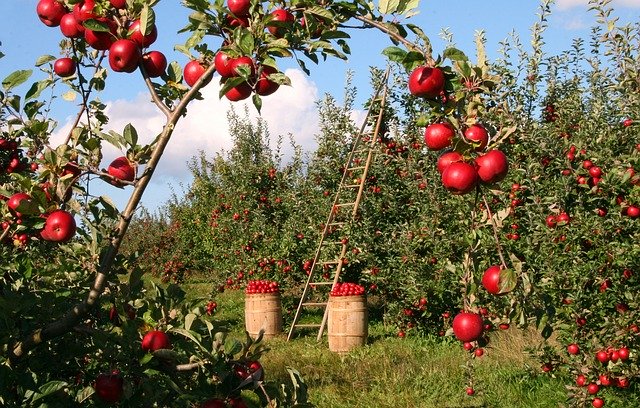Several months ago, the Valley was enjoying the beauty and fragrance of many apple blossoms as Jonathan, Granny Smith, and others burst into their springtime finest. Although the annual festival was cancelled, the trees went right on blooming regardless of whether we celebrated them or not.
Now in late September, the blooms have long since withered. In their places are red, green, and golden apples either ripe or nearly so. Thanks to God’s abundant gifts of rain, sunshine, and fertile soil, it looks like this year’s harvest will be another good one. Pickers are in the orchards reaping nature’s bounty that will provide us with fresh eating apples as well as apple sauce, apple cakes, apple butter, apple jelly, and a million other delicious apple products.

Imagine, however, if the trees failed to produce. Imagine how disappointing it would be not only for us who enjoy these delicious fruits, but especially for their growers who depend on them for their livelihoods. Occasionally there is a bad year when all of their labor and expense result in little to no yield.
Now imagine if fruit failure occurred several years in a row. At some point, the landowners would have to consider cutting their trees and planting other crops that would deliver better income. This was the dilemma an orchardist faced in one of Jesus’ parables.
In Luke 13, the Master Storyteller told of a farmer who had a fig tree that didn’t bear any figs. For three years the owner eagerly visited his tree anticipating a bountiful harvest only to be repeatedly disappointed. Upon his last visit, he told the vineyard’s caretaker to fell the unproductive tree for it was just wasting good soil and space.
The caretaker convinced the owner to extend some horticultural grace and spare the fruitless fig giving it just one more chance before firing up his chainsaw. Luke doesn’t tell us if this advice was followed but we assume it was.
The bigger issue and focus of the parable wasn’t about literal figs or apples anyway. It was about those who claimed to be God’s people who weren’t producing God’s fruit. Although it was particularly aimed at the religious leaders and their nation, the story certainly echoes in our ears today. Are we bearing fruit for our Master or are we just using up His soil, water, and sunshine?
Of course the question naturally arises as to what type of fruit God expects. Figs and apples we know, but what exactly was Jesus referring to? Even a casual reading of the Scriptures reveals that God desires and expects His people to bear love, joy, peace, patience, kindness, goodness, gentleness, faithfulness and self-control.
We are to combine the fertile soil of God’s Word with the gracious water of His Spirit and the bright sunlight of His Son to produce actions and attitudes that love God and neighbor. Our lives are to demonstrate holiness in thought as well as deed. Our fruit should be obvious in the way we care for the lost, the homeless, the unborn, the children, the poor, and the oppressed. Our fruit should look like Jesus’ life.
Today, we might consider Jesus’ church as the entire orchard, each congregation a tree, and each believer a branch. We should use whatever resources God has entrusted to us in the location He has planted us to produce as much good fruit as possible. After all, we may be living in the grace period with only one more chance to be productive.
At harvest time, two contrasting scenarios unfold. On the one hand, the owner is bitterly disappointed as He tours His barren trees. But on the other, imagine Him returning to find branches hanging to the ground overburdened with much fruit for His glory. That’s our goal and our privilege. Let’s allow the apple harvest season to motivate our spiritual productivity.
Blessings, George